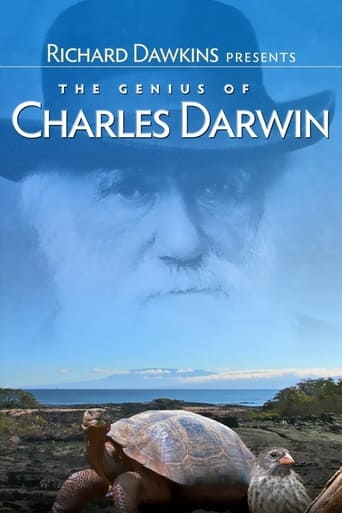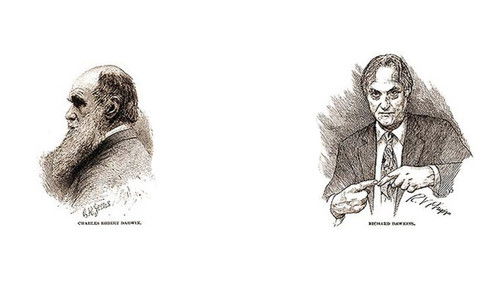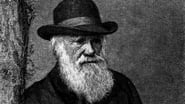Robert J. Maxwell
Oxford biologist Richard Dawkins -- forthright, candid, firm, but never angry -- confronts religious believers of various types, from grammar school teachers to the Archbishop of Canterbury.I've always admired the Archbishops of Canterbury. They're cool. In the sixties, the Archbishop had a carefully styled combination haircut blending Eton with the Beatles. This one has a professorial beard and sounds like Roger Moore playing James Bond. Can you imagine the Pope with a pony tail? I'm afraid you won't learn much about the details of Charles Darwin's "theory" of evolution. You learn about Darwin's life and his struggles with his own beliefs, but as Dawkins wanders from Kenya to New York and London, he doesn't tackle the problems that evangelicals keep raising, although the problems themselves have already been solved -- the eye of the octopus and the little tail of the flagellates. That's not Dawkins' goal.His job is to convince us that religious belief, especially in the Bible, is a lot of nonsense. I agree with everything Dawkins says, almost. As an anthropologist I would have to point out that in science probability never achieves unity. There must always be some slight doubt about what's going on, otherwise science is no longer science. That's why my walls and shelves are decorated with icons representing all sorts of religions -- a mezuza, a crucifix, the dancing Shiva, two unnamed Hindu gods, a statue of Huizilpotchli, and a stone from a Cheyenne sacred circle in Montana. One never knows.But, as far as the Bible goes, Dawkins has it all over the evangelicals who have created museums in which people and dinosaurs are contemporaries. Dawkins doesn't say so, but the Bible never makes such a claim. The earth is believed to be about 6,000 years old (instead of about four billion) because Bishop Ussher in the 17th century added up all the "begats" in the Bible and determined that the planet was created at 9 AM Oct 3, 4004 BC.The fact that so many people are fully committed to this delusion suggests the nature of the stone wall that poor Richard Dawkins is batting his head against. How do you challenge an axiom? I wouldn't look to this documentary for a biography of Charles Darwin or for an explicit explanation of how natural selection works. It's pretty brutal, by the way, and you see lions catch antelope in mid air. Yes, it's bleak, Dawkins tell us, before he claims that cut-throat competition and eugenics are a misapplication of Darwin's ideas. Can he be so sure? He also doesn't address a question that's been lingering in my own mind for some time. Andrew Greeley -- the American sociologist, novelist, and priest -- argued that politics were responsible for less human misery than religious conflicts. We can see the dynamics at work in the Middle East today, if we bother to look and understand. Come to think of it, though, priests aren't exactly in the forefront of the anti-science movement. In the early years of the last century there was Teilhard de Chardin, a French priest, philosopher, and human paleontologist. De Chardin called humans "the thinking part of the earth," with which Dawkins would probably agree. De Chardin also had a hand in many important goings on in human evolution. He was involved in the discovery of (gulp) Piltdown man, for instance. It may be that religion's hold over us should be loosened, not just because it's contradicted by science but because it's dangerous. "My tribe is honing knives to use against your tribe," as the poet wrote. Yet where would humans be without their myths?
rgcustomer
On the one hand, it's always great to see the rare occurrence of a proud atheist on the television (at least, on this side of the pond...), and it is delightfully refreshing to see someone give no more deference to religious beliefs than any other belief, directly challenging them.On the other hand, it's frustrating that Dawkins shows us none of the mountain of evidence that we know exists about evolution, and takes on none of the supposed counter-evidence pushed by charlatans.I think if you have a mini-series documentary, you have an obligation to actually accomplish more than simply state your side, even if it is the right side. You have to actually show evidence. Now, three episodes is hardly enough time to prove anything, but it should be enough to not be easily dismissed. Sadly, that goal is not met.I saw this because I wanted to see the genius of Charles Darwin, and I feel I didn't see it.7/10 because this sort of thing is so rare, but no higher because the goal was not met.
pbrekke
This is a great documentary series from Channel 4, hosted by professor Richard Dawkins, well-known darwinist. The series mixes segments on the life and discoveries of Charles Darwin, the theory of natural selection and evolution, and Dawkins' attempts at convincing a group of school children that evolution explains the world around us better than any religion.Most of the story line and the presentation is compelling, and the evidence for evolution is completely overwhelming. This, however, is also what limits the appeal of the series: Dawkins tries a bit too hard - a slightly less argumentative presentation of evolution would probably serve Dawkins' cause better.
jmaycock
Dawkins has done a good job here. He lays out the case for why evolution is a fact, not a theory. Just like gravity is a fact, and if you don't believe me I invite you to jump out of a 10 story building (as Dawkins says)! I would have preferred more emphasis on the scientific aspects of evolution, with more in-depth discussion and analysis, but overall he delivered. Espesially nice was the interaction at the start of the film with students at a secondary school, some of whom said that they don't believe in evolution - even if evidence is presented - because it goes against their holy book. Also of note was a discussion with teachers at the same school who told of their struggles to teach science verses overturning pre-existing ideas the students have from religion, parents etc. Very enjoyable stuff.




